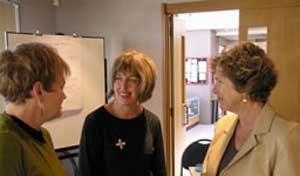Education Adviser
Tasks & duties

Educational advisers may do some or all of the following:
-
assist in curriculum implementation (putting a teaching programme in place)
-
consult with education professionals
-
assess and liaise with schools to find educational areas that need developing
-
develop plans for schools and help implement them
-
encourage schools to apply for teaching programmes
-
prepare proposals for new projects
-
analyse educational methods, policies and trends
-
develop courses, resource materials or policies
-
advise on textbooks and materials
-
write reports and newsletters
-
organise and run professional development programmes on new resources and teaching methods
-
assist schools with te reo Māori, and Māori and Pasifika curriculum implementation
-
assist schools with home-school liaison (parents teaching their children at home)
-
implement new Ministry of Education priorities and projects
-
network with local and national teacher associations
Specialisations
Educational advisers usually specialise in areas such as curriculum development and implementation, cultural issues, teaching strategies, senior examinations, assessments, or school management.
Skills & knowledge

Educational advisers need to have:
-
knowledge of teaching methods
-
knowledge of human behaviour and development
-
teaching skills and knowledge of one or more subject areas
-
understanding of education administration and policies
-
knowledge of the New Zealand curriculum framework and the national education guidelines
-
knowledge of the Treaty of Waitangi
-
understanding of social, political and cultural issues in New Zealand and overseas
-
knowledge of the structure of New Zealand training providers and how they work
-
skill in analysing, interpreting and evaluating information
-
excellent listening, communication and people skills
-
research skills
-
computer skills
-
good decision-making skills
-
planning, organisational and time-management skills
Entry requirements
To become an educational adviser, you usually need a teaching qualification such as a Bachelor of Education, and teaching, educational administrator or course development experience. Some employers also prefer further postgraduate qualifications in education.
Secondary education
A tertiary entrance qualification in a variety of subjects is needed to enter tertiary training.
Training on the job
Skills are gained on the job and educational advisers may also attend courses and workshops to update their knowledge. Many people work towards postgraduate qualifications on the job. In some workplaces a new employee is trained and works alongside an experienced adviser.
Useful experience
Useful experience includes:
-
teaching work
-
educational administration
-
work in a government department
-
work involving contact with people
-
public policy development
-
research work
-
running workshops for adults
Related courses
Curriculum Studies
Education Administration
Teacher Education: Tertiary
Teacher Education: General (Pre-Service)
Teacher Education: Primary (Pre-Service)
Teacher Education: Secondary (Pre-Service)
For more information, please refer to Career Services.
Document Actions
